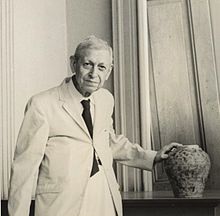利用者:犬瘋子/sandbox
 |
ここは犬瘋子さんの利用者サンドボックスです。編集を試したり下書きを置いておいたりするための場所であり、百科事典の記事ではありません。ただし、公開の場ですので、許諾されていない文章の転載はご遠慮ください。
登録利用者は自分用の利用者サンドボックスを作成できます(サンドボックスを作成する、解説)。 その他のサンドボックス: 共用サンドボックス | モジュールサンドボックス 記事がある程度できあがったら、編集方針を確認して、新規ページを作成しましょう。 |
Henry Otley Beyer | |
|---|---|
 | |
| 生誕 |
Henry Otley Beyer 1883年7月13日 Edgewood, Iowa, U.S[1] |
| 死没 |
[1] Manila, Philippines[1] |
| 国籍 | American[1] |
| 職業 | Anthropologist |
| 著名な実績 | Founding member of the Anthropology department at the University of the Philippines in 1914. Department head from 1925 until retirement in 1954. Known as the Father of Philippine Anthropology.[1][出典無効] |
Henry Otley Beyer (July 13, 1883 – December 31, 1966) was an American anthropologist, who spent most of his adult life in the Philippines teaching Philippine indigenous culture. He is known[誰?] as the Father of Philippine Anthropology.
ヘンリー・オトリー・ベイヤー(英語: Henry Otley Beyer、1883年7月13日 - 1966年12月31日)は、「フィリピン人類学の父」と呼ばれた[2]アメリカ合衆国出身の人類学者である。成人してからの人生の大半を、フィリピンにおいてフィリピンの先住民文化を教授することに費やした。
Biography
[編集]略歴
[編集]Beyer was born in Edgewood, Iowa to a pioneer family of Bavarian origin and developed an interest in the Philippines when he visited the Philippine exhibit at the Louisiana Purchase Centennial Exhibition in St Louis, Missouri in 1904.
ベイヤーはアイオワ州エッジウッドでバイエルン移民の家柄の開拓者一家に生まれた。1904年にミズーリ州セントルイスでセントルイス万国博覧会が開催された際、ベイヤーはフィリピンの展示を訪れ、フィリピンへの関心を持つようになった。
After graduating with a bachelor's degree from Iowa State University and a master's degree in chemistry from the University of Denver in the following year, he volunteered to teach in the Philippines. His first years in the Philippines were spent as a teacher in the Cordillera Mountains on Luzon island, home of the Ifugao people. He would later marry, Lingayu Gambuk, the 15 year old daughter of an Ifugao village chief of Amganad. They had a son named William born in 1918. While in a Catholic country, H. Otley Beyer remained a Protestant throughout his life.
アイオワ州立大学で学士号を、翌年にはデンバー大学で化学分野の修士号を取得した後、フィリピンでの教育に志願して赴いた。フィリピンでの最初の数年は、イフガオ族の故郷であるルソン島のコルディエラ山脈で教師として過ごした。アムガナッドのイフガオ族の村長の娘と結婚し、1918年に彼らはウィリアムと名づけられた息子を授かった。カトリックの国にいながら、べイヤーは生涯を通じてプロテスタントの信仰を守り続けた。
He pursued postgraduate anthropological studies at Harvard University. He was appointed ethnologist in the Philippine Bureau of Science and part-time head of the Philippine Museum. He became sole instructor in anthropology at the University of the Philippines in 1914. In 1925, he became the head of the university's department of anthropology and its first professor. By that time, the anthropology department and its museum that Beyer himself built already occupied the entire second floor of Rizal Hall which housed the university's College of Liberal Arts until 1949. Beyer remained head of the department until his official retirement from the University of the Philippines in 1954 after forty years of full-time teaching.
彼はハーバード大学の大学院で人類学の研究に取り組んだ。フィリピン科学局で民俗学者に任ぜられ、フィリピン博物館の非常勤の館長に任命された。1914年にフィリピン大学で人類学分野における唯一の講師となった。1925年には、フィリピン大学人類学科の学科長および最初の教授となった。そのときまでに、人類学科とベイヤー自身が設立した附属博物館は、1949年まで教養学部が置かれたリサール・ホールの2階すべてを占めていた。べイヤーは40年間にわたって専任教員として勤めた後、1954年にフィリピン大学で定年を迎えるまで学科長の地位にあった。
During the Second World War, Beyer was initially allowed to continue his work at Rizal Hall, but he was later interned along with other Americans in the Philippines.
第二次世界大戦の間、べイヤーは当初リサール・ホールで研究を続けることを許されていたが、後にフィリピンにいた他のアメリカ人とともに抑留された。
Before his death, the University of the Philippines, Silliman University and Ateneo de Manila awarded him with honorary doctorates.[1] He also received a number of awards for his 60 years of scholarship in the Philippines. In 1965, the University of the Philippines held an H. Otley Beyer Symposium in his honor. The proceedings of the symposium were published two years later.
He died in 1966.[3]
Legacy
[編集]The National Library of Australia acquired his papers and extensive library in 1972.
Quotes
[編集]Archaeological work is like a fascinating mystery story, with the specimens and site data serving as vital clues - and everything is of most importance while both the specimens and your memory of how and where they were found is still quite fresh, and unconfused by later activities elsewhere.—In a letter to a colleague in March 1955.
Beyer described his work as trying to serve the University [of the Philippines] and to procure and conserve for the People of the Philippines the evidence of their abundant ancient culture.—In a letter to Carlos P. Romulo, then president of the University of the Philippines.
References
[編集]- Gosling, Andrew. An American in Manila: Otley Beyer and his collection at the National Library Of Australia. National Library of Australia News, 7 (10), July 1, 1997, pp 6–8.
- ^ a b c d e f Ademuyiwa Ogunseye (2003年). “Henry Otley Beyer 1883-1966”. Minnesota State University. Template:Cite webの呼び出しエラー:引数 accessdate は必須です。
- ^ Associated Press (January 2, 1967). “Dr. Otley Beyer, Anthropologist. Noted Researcher in the Philippines Is Dead at 83”. New York Times 2014年7月21日閲覧. "Dr. H. Otley Beyer, an American who has been called the father of Philippine anthropology, died here yesterday. He was 83 years old."
- ^ Associated Press (January 2, 1967). “Dr. Otley Beyer, Anthropologist. Noted Researcher in the Philippines Is Dead at 83”. New York Times 2012年11月22日閲覧. "Dr. H. Otley Beyer, an American who has been called the father of Philippine anthropology, died here yesterday. He was 83 years old."
